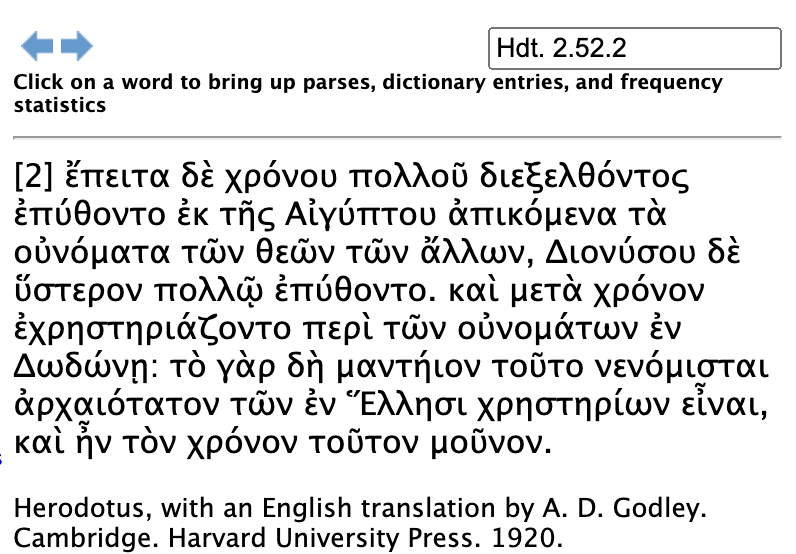Fresh Batch #183: Etymology
Why Greek Explanations Should Be Ignored, Admitted by Their Own Writers
Jacob Bryant cited Empedocles (Analysis Anc. Myth. p. 129.), “Αλλα θεοι των μεν μανιην απετρεψατε γλωσσης, Εκ δ’ όσιων στοματων καθαρην οχετευσατε πηγην. (You prevented lunatics from accessing language, but from the mouths of honest ones you channelled a clean flow), Και σε, πολυμνηστη, λευκωλενε παρθενε, μουσα, Αντομαι, ών θεμις εστιν εφημεριοσιν ακουειν. (And you, desired white virgin, muse, I hope those in charge will listen to you.)
He continued (Ib. p. 130.), “The Grecians were so prepossessed with a notion of their own excellence and antiquity, that they supposed every ancient tradition to have proceeded from themselves. Hence their mythology is founded upon the grossest mistakes: as all extraneous history, and every foreign term, is supposed by them to have been of Grecian original. Many of their learned writers had been abroad; and knew how idle the pretensions of their countrymen were. Plato in particular saw the fallacy of their claim. He confesses it more than once: yet in this article nobody was more infatuated. His Cratylus is made up of a most absurd system of etymology. Herodotus expressly says, that the Gods of Greece came in great measure from Egypt. (Herodotus. L. 2. c. 4. and L. 2. c. 52.)”
In response to the above citation, regarding the Egyptians reckoning the twelve months, twelve gods, and thus the twelve houses or signs of the Zodiac, there are claims that the year was divided into ten segments, and that the Great Year was divided into ten ages in the ancient Etruscan system, but I cannot verify this through Etruscan inscriptions. I think this is accepted from other historical accounts, which may or may not be accurate. I can verify, however, that there was a different astrological house system than the one we know of today from accounts just prior to the Roman Empire converting to Christianity. The twelve-house system of Egypt seems to be a modern reckoning, which is why it is more accurate.
Bryant ignored the Pelasgian influence, and opted to say the Greeks inherited the names of Gods from the Phoenicians, but Herodotus expressly says that they inherited them from the Pelasgians, who are the Etruscans. He also ignored the account of Dionysius of Halicarnassus, that the Etruscans were called Pelasgians by the rest of the world.
“Myrsilius of Lesbos does not call the people Pelasgians, but Tyrrhenians (Italians). And the same people were called by the rest of the world both Tyrrhenians (Italians) and Pelasgians.
“Indeed, those probably come nearest to the Truth who maintain that the Etruscan nation migrated from nowhere else, but was native to the country.”—Dionysius of Halicarnassus
My work has demonstrated the connection between the ancient Italians and Egyptians, specifically the fact that there is Italian architecture found in the Great Pyramid, from which all other pyramids were imitated, yet never duplicated.
Michael Grant’s observation corroborates an Egyptian connection that supports my work regarding the ancient universal empire. He wrote (The Etru. pp. 64, 65), “The Etruscans also maintained a very un-Greek attitude to the after-life. Most Greeks, in their various ways, believed in a life after death, but their views included nothing to compare with the intense conviction of the Etruscans that death was not a real break in continuity at all but a prolongation and perpetuation of life on earth. That is the motivation behind the innumerable, varied, and grandiose tombs which contribute so enormously to our knowledge of the beliefs, customs and arts of the Etruscans. These graves, once again, create a non-Greek impression. For one thing, there is immense wealthiness of the treasures deposited in their chambers, more akin to the practice of the ancient Egyptians than the Greeks, and then there are all their brilliantly colourful wall-paintings, especially at Tarquinii.”
This suspicion leads me to conclude that the Egypto-Greek system descends from the Etruscan system on account of the hieroglyphics being Greek-based. Since Greek uses the Etrusco-Phoenician (Pelasgic) letter system, yet the Etruscan has no affinity to Indo-European (like Greek has) but is clearly the parent of Latin, Celtic, and Sanskrit, then it follows logically that the Etruscan system must be older, and is likely the parent of this Amonian radical system that Jacob Bryant noticed.
Bryant continued (Ib. p. 130.), “Yet Socrates is by Plato in this treatise made to derive Artemis from το αρτεμες (to artemes), integritas (in whole): Poseidon from ποσι δεσμον (posi desmon), fetters to the feet (shackles): Hestia from ουσια (ousia), substance and essence: Demeter, from διδουσα ώς μητηρ (didousa ós meter), distributing as a mother: Pallas from παλλειν (pallein), to vibrate, or dance: Ares, Mars, from αρρεν (arren), masculum, et virile (masculine and manly): and the word Theos, God, undoubtedly from Theuth of Egypt, from θεειν (Theein), to run.”
These etymologies are bunk, again, not acknowledging Etrusco-Phoenician origins, such as Maur (Mars), or the Egyptian Arez, which might be related to Arezzo, an Etruscan epicenter, and Tot, the Roman-Gallo version of Thoth, from which the Greeks transliterated Θουθ (Thouth; Thoyth). I can go on an on, but for the sake of brevity, it’s better to defer to the Spirit Whirled series. Almost every archetype used by Egypto-Greeks can be found in the Celto-Etruscan continent of Europe, and the deciding factor for demonstrating antiquity is the language: those of ancient Italy cannot be translated even in the present day because they are alien to the rest of the world, meaning they are older. Their lingua franca eventually became Latin, which is the only thing from the Italian peninsula that Greek has affinity to regarding language.
Bryant continued (Ib. pp. 130-3.), “Innumerable derivations of this nature are to be found in Aristotle, Plato, Heraclides Ponticus, and other Greek writers.
“There is a maxim laid down by the scholiast upon Dionysius; which I shall have occasion often to mention. Ει βαρβαρον το ονομα, ου χρη ζητειν Έλληνκην ετυμολογιαν αυτου. If the name is barbaric (strange; foreign), don’t ask a Greek for its etymology. (Eustathius of Thessalonica on Dionysius Periegetes.)
“It is a plain and golden rule, posterior in time to the writers above, which however common sense might have led them to have anticipated, and followed: but it was not in their nature. The person who gave the advice was a Greek, and could not for his life abide by it. Εννοω γαρ, ότι πολλα όι Έλληνες ονοματα, αλλως τε και όι ύπο τοις Βαρβαροις οικουτες, παρα των Βαρβαρων ειληφασι–ει τις ζητοι ταυτα κατα την Έλληνικην φωνην, ώς εοικοτως κειται, αλλα μη κατ’ εκεινην, εξ ής το ονομα τυγχανει ον, οισθα ότι αποροι αν. (It is true, that Socrates is made to say something very like the above. I am very sensible that the Grecians in general, and especially those who are subjects to foreigners, have received into their language many exotic terms: if any person should be led to seek for their analogy or meaning in the Greek tongue, and not in the language from whence they proceeded, he would be grievously puzzled. Plato in Cratylo. p. 409. Translated by Bryant.) Who would think, when Plato attributed to Socrates this knowledge, that he would make him continually act in contradiction to it? Or that other writers (Suidas, Stephanus, Etymolog. Eustathius, &c. So Coptus in Egypt, from κοπτειν.), when this plain truth was acknowledged, should deviate so shamefully? that we should in after times be told, that Tarsus, the ancient city in Cilicia, was denominated from ταρσος, a foot: that the river Nile signified νη ιλυς (silty): and that Gader in Spain was Γης δειρα (Earth beast).
“The ancients in all their etymologies were guided solely by the ear: In this they have been implicitly copied by the moderns. Inquire of Heinsius, whence Thebes, that ancient city in upper Egypt, was named; and he will tell you from תבא, Teba, stetit (Stood. See Callimachus. vol. 2. Spanheim’s not. in Hymn. in Del. v. 87. p. 438.): or ask the good bishop Cumberland, why Nineve was so called, and he will answer from Schindler, that it was a compound of Nin-Nau, נין נוה (nin nue), a son inhabited. But is it credible, or indeed possible, for these cities to have been named from terms so vague, casual, and indeterminate; which seem to have so little relation to the places, to which they are appropriated; or to any places at all? The history of the Chaldeans is of great consequence: and one would be glad to know their original. They are properly called Kasdim: and are very justly thought to have been the first constituted nation upon the earth.”
There are two points I’d like to make. The first is a mistake I’ve made when looking at the English transliteration of Chaldeans and comparing it to Kasdim. Ch implies use of the letter chet, which makes a guttural sound, and when I read non-Greek oriental languages being transliterated as having Ch at the beginning of a word, it usually implies the word begins with ח (chet) in Hebrew. In the instance of the word Kasdim, it is written with a caph (כ), which functions like a K and ought never to be transliterated as Ch. But Bryant and many others transliterate Kasdim as Chasdim, which I believe is an attempt to influence others into accepting they are the same people, or priesthood, as the Chaldeans, which I don’t know that they are. The second point of concern is more important, which is that in this Abrahamic mindset, there is a broad acceptance of the Chaldeans being the first constituted nation upon the earth. Thus, archaeological findings are made to conform to this idea, or opinion, no matter how absurd the conformity is. This is fraud of Mosaic history, which the chronological-archaeological record does not support. Sure, there are archaeological finds that support the ideas of Mosaic history because the ideas have been used by the ruling classes to control people for the majority of the Common Era, but there are no finds supporting Mosaic history from the era when the events are purported to have occurred. If you think the methods for dating artifacts are precise, you haven’t read anything of antiquity. It is guesswork at best, and anyone who lacks the humility to admit this is disingenuous. I suspect this is the reason for why there are still discoveries being made to corroborate this religious narrative, two to four millennia after the alleged events, when the time to have established the authenticity of the events through artifacts was thousands of years ago. The artifacts and archaeological record ought to have demonstrated history, not writings. But in our current situation, writings were used to construct history, and now the archaeological record is being used to conform to the writings, or in worse situations, being forged to support the writings.
To witness how I arrived at my conclusions, so you can examine the forgery that’s occurred for yourself, as well as the priest class behind it, invest in the Spirit Whirled series. To appreciate how I arrived at my conclusions, so that you can form your own regarding the cover-up of Celtic history, which is ancient Italian and Mediterranean history, read The Real Universal Empire.







Become a member to access the rest of this article.
Keep reading with a 7-day free trial
Subscribe to Ancient History, Mythology, & Epic Fantasy to keep reading this post and get 7 days of free access to the full post archives.









